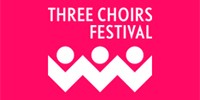
 United Kingdom Three Choirs Festival (8) – Okeover, Purcell, Handel, Greene, Bliss, Kodály, Vaughan Williams, Delius, Finzi and others: Vicki Field (soprano), Quentin Letts (narrator), Philip Vaughan (organist), Ensemble Sine Nomine/Sebastian Field (conductor), St Mary de Lode Church, Gloucester, 27.7.2016. (RJ)
United Kingdom Three Choirs Festival (8) – Okeover, Purcell, Handel, Greene, Bliss, Kodály, Vaughan Williams, Delius, Finzi and others: Vicki Field (soprano), Quentin Letts (narrator), Philip Vaughan (organist), Ensemble Sine Nomine/Sebastian Field (conductor), St Mary de Lode Church, Gloucester, 27.7.2016. (RJ)
How long has the Three Choirs Festival been in existence? The official answer is “Since 1715”. However, this morning’s presentation, entitled Gloster Gossip, suggested that the cathedral choirs of Gloucester and Worcester at least have been meeting up on a regular basis from 1662 onwards. This review of the Festival over the centuries offered a good opportunity to perform the music associated with it and pick up some juicy pieces of gossip along the way.
John Okeover was Gloucester Cathedral’s organist in the late 17th century and the first work to be sung was his anthem Grant we beseech thee, merciful Lord. This was followed by an excellent account of Purcell’s O be joyful (Psalm 100) sung by countertenor Sebastian Field and choir with trumpet and organ accompaniment.
In 1738 the first oratorio seems to have come to Gloucester, but Alexander’s Feast by Handel was obviously deemed unworthy of performance in the cathedral and was performed in the Booth Hall instead. The choir brightened up the morning with Happy, happy pair from this oratorio,
The marriage of secular with as sacred music was well established by 1745 when Maurice Greene of the Chapel Royal brought some singers to Gloucester to perform his pastoral opera Florimel. The hit song from the opera was The Charms of Florimel charmingly sung on this occasion by Vicki Field with organ accompaniment by Philip Vaughan.
The gossipy letters of Mary Yorke, wife of the Bishop of St Davids, shed plenty of light on the social life of the Festival in the second half of the 18th century. (When her husband moved to the see of Gloucester she became the first Lady Steward of the Festival.) Mrs Yorke describes how a catastrophe befell Samuel Harrison, a leading chorister of the Chapel Royal, at the 1778 Festival when his voice broke. However, Harrison was to return to Gloucester to become the Festival Manager in 1810 and developed a fine tenor voice. The audience were treated to one of his compositions, a setting of Cowper’s A Rose has been wasted.
A Gloucestershire composer with Festival connections was John Stafford Smith who in 1790 wrote an anthem for the Anacreontic Society, an organisation of aristocratic amateur musicians founded in 1766. The anthem To Anacreon in Heaven was later adopted by the American branch of the Society and its melody later used for The Star-Spangled Banner. It was fascinating to hear the choir sing this well-known melody with the original words.
The 1910 Festival saw the premiere of one of the most enduring works of British music, Vaughan Williams’ Fantasia on a Theme by Thomas Tallis, and how fitting it was that the Ensemble Sine Nomina should offer us the Tallis original, When thou. Lord shall stand enclosed.
The 1928 Festival welcomed an eminent Hungarian Zoltán Kodály, who was impressed by the way the choir learned his Psalmus Hungaricus so speedily, and was introduced to the popular tonic solfa method of reading music which they had used. Soprano Vicki Field marked the visit not with the Psalmus but a song Esti Dal above a wordless chorus.
In the 1920 the radio age had begun and people could stay at home and listen to concerts. This is how Delius came to hear Brigg Fair and The First Cuckoo of Spring broadcast from the Festival in 1925 in the French town of Grez sur Loing. An enchanting arrangement of The First Cuckoo for chorus and choir was a very acceptable substitute for the orchestral version.
A particularly interesting piece of gossip was the fact that Sir Arthur Bliss’s Beatitudes were due to be performed at the consecration of the new Coventry Cathedral in 1962 but Britten’s new War Requiem was used instead and the Beatitudes had to make do with the cramped space of the Belgrade Theatre. (The work had to wait 50 years before it was finally performed at Coventry!) Extracts from the work, The Call and the Amens (the latter with trumpet, flute and organ accompanying the choir) suggest that it deserves to be heard more often.
Gerald Finzi was a regular visitor to the Festival when he moved to the Cotswolds so how better than to remember him than with his song My spirit sang all day, O my Joy.
Roger Jones